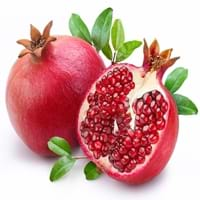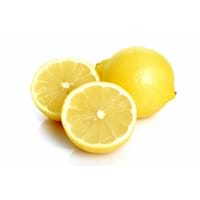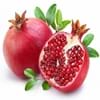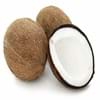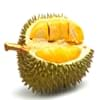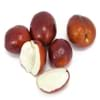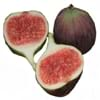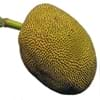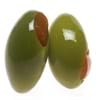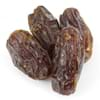Health Benefits
Cancer prevention, Heart care, Helps in cartilage regeneration, Improves stomach health, Increase in haemoglobin, Increases metabolic rate, Prevents constipation
Arthritis treatment, Asthma treatment, Cancer prevention, Kidney stone treatment, Prevents constipation, Purging blood, Treatment of rheumatism
General Benefits
Boosts immune system, Controls blood pressure, Controls blood sugar levels, Digestive aid, Maintains healthy cholesterol level
Boosts immune system, Cures headache, Cures fever, Digestive aid, Flu treatment, Maintains healthy cholesterol level, Treatment of common cold
Skin Benefits
Anti-aging benefits, Skin rejuvenation, Treatment of acne
Heals sunburn, Reduces wrinkles, Skin rejuvenation, Treatment of acne, Treatment of skin diseases
Hair Benefits
Prevents hair loss, Promotes longer and healthier hair, Treatment of dandruff
Prevents hair loss, Treatment of dandruff
Allergy Symptoms
Abdominal pains, Anaphylaxis, Itching
Eczema, Hives, Inflammation, Itching, Skin rash, Swelling
Side Effects
Allergic reaction, Cold, Breathing difficulty, Irritation, Swelling
Diuretic effects, Heart burn, Tooth decay, Chances of sunburn
Best Time to Eat
Best if taken as a breakfast (or empty stomach), As a snack in the late afternoon, Eat the fresh ones, avoid mixing with any other foods, don't eat after meal., Morning time (before lunch)
Along with meal, Best to drink lemon water on an empty stomach., Don't consume at night and before bed
Vitamin B5 (Pantothenic Acid)
Vitamin C (Ascorbic Acid)
Vitamin K (Phyllochinone)
Calories in Fresh Fruit with Peel
Not Available
Not Available
Calories in Fresh Fruit without Peel
Calories in Frozen Form
Not Available
Calories in Canned Form
Not Available
Type
Tree fruit
Citrus, Tree fruit
Season
Autumn
All seasons
Varieties
Balegal, Crab, Cloud, Francis, Freshman and Granada
Avalon Lemon, Bears Lemon, Buddha's Hand, Bush Lemon, Citron, Eureka Lemon, Dorshapo Lemon, Finger Citron and Fino Citron
Color
Dark red, Light pink-red
Yellow, Yellowish-orange
Origin
India, Iran
China, India
Soil Type
Clay, Sand
Well-drained
Climatic Conditions
Cold, Dry, Hot
Hot, Sunny
Facts about
- Pomegranate means apple with many seeds.
- It was called as the “apple of Grenada” in early English.
- In Hinduism, this fruit symbolizes prosperity and fertility.
- Pomegranate trees can live upto 200 years.
- Oil extracted from lemon peels is used for fingerboard of guitars.
- During Renaissance, ladies used lemons to redden their lips.
- Aroms of lemon decreases the level of stress hormones.
Other Countries
Africa, India, Middle east, Pakistan
Argentina, Brazil, India, Iran, Italy, Mexico, Spain, Turkey, United States of America
Top Importer
Europe
United States of America
Top Exporter
India
Mexico
Botanical Name
Punica granatum
Citrus limon
Synonym
Punica malus
Not Available
Subkingdom
Tracheobionta
Tracheobionta
Division
Magnoliophyta
Magnoliophyta
Class
Magnoliopsida
Magnoliopsida
Order
Myrtales
Sapindales
Family
Lythraceae
Rutaceae
Species
P. granatum
C. limon
Generic Group
Pomegranate
Citrus fruit
Difference Between Pomegranate and Lemon
We might think that Pomegranate and Lemon are similar with respect to nutritional value and health benefits. But the nutrient content of both fruits is different. Pomegranate and Lemon Facts such as their taste, shape, color, and size are also distinct. The difference between Pomegranate and Lemon is explained here.
The amount of calories in 100 gm of fresh Pomegranate and Lemon with peel is Not Available and Not Available and the amount of calories without peel is 83.00 kcal and 29.00 kcal respectively. Thus, Pomegranate and Lemon belong to High Calorie Fruits and Low Calorie Fruits category.These fruits might or might not differ with respect to their scientific classification. The order of Pomegranate and Lemon is Myrtales and Sapindales respectively. Pomegranate belongs to Lythraceae family and Lemon belongs to Rutaceae family. Pomegranate belongs to Punica genus of P. granatum species and Lemon belongs to Citrus genus of C. limon species. Beings plants, both fruits belong to Plantae Kingdom.
